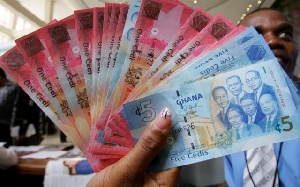Ghana’s gross reserves have increased to $9.2billion in March 2019, from the $6.3 billion recorded in February 2019, the highest by the country since February 2018.
The net reserves also rose to $6.3 billion in March from $3.2 billion in February.
The Bank of Ghana (BoG) stated in a release on its website that the gross reserves are sufficient to cover 4.7 months of imports, up from the 3.2.
The central bank’s latest Summary of Economic and Financial Data also showed that Ghana’s debt stock increased by 21.5 per cent as of the end of 2018 adding GHS30.6 billion to the GHS142.6 billion debt of 2017.
Ghana’s debt stock has, therefore, hit GHS173.2 billion.
The country’s external debt at the end of 2018 stood at GHS86.3 billion.
The domestic component of the total debt stock was GHS86.9 billion.
The two represent 28.9 per cent and 29.1 per cent of GDP, respectively.
As far as the external sector is concerned, total imports as of February 2019 hit $2.1 billion while total exports in the same period hit $2.6 billion.
Gold exports earned the country $944.4 million. Cocoa exports got Ghana $565.9 million and oil brought in $721.5 million.
Within the period, Ghana imported $380.8 million worth of oil and non-oil imports hit $1.8 billion.
Also, the central bank’s data showed that Non-Performing Loans in the banking sector dropped from 21.6 per cent as of February 2018 to 18.2 per cent as of February 2019.
Total deposits in the banking sector ballooned to GHS71.9 billion in February 2019 from GHS59.9 billion within the same period last year. Total assets grew to GHS108.9 billion from GHS95.1 billion cedis within the same period.
A couple of weeks ago, Ghana’s Minority in parliament said within a space of two years, the Akufo-Addo government has added GHS80 billion to Ghana’s debt stock, adding that the fall of the local currency, the cedi, alone, added GHS15.3 billion to the bill.
The tottering cedi almost hit the $1: GHS6 mark in March but made some gains to hover at $1: GHS5.65 after the Bank of Ghana pumped some $800 million into the system.
According to the Minority in parliament, the fall in the cedi essentially meant Ghana’s external debt stock, as of November 2018, shot up to GHS101.3 billion at the current exchange rate.
At a roundtable on Wednesday, 20 March 2019, on the theme: ‘An Encounter with the Minority on the state of Ghana’s economy’, the Caucus’ spokesperson on finance, Cassiel Ato Forson, with reference to the 2019 budget, said: “All fiscal and financial estimates were made using a projected Cedi/Dollar exchange of GHS4.8 per Dollar. Currently, the Cedi/Dollar exchange is quoted at GHS5.65 per Dollar. The implication is that all government loans that were expected to be serviced at the projected exchange rate of GHS4.8 have suddenly become more expensive”.
“The stock of total public debt has gone up significantly at the current cedi-dollar exchange rate of GHS5.65. In November 2018, the stock of total external debt as reported by the Bank of Ghana was US$18.014 billion.
“At the then exchange rate of GHS4.8 per dollar, the total external debt in local currency was GHS86.4 billion. Even if the government has not added anything to the stock of external debt over the last three months, which we all know is not possible, the US$18.0 billion external debt recorded in November 2018 will be translated at the current exchange rate into GHS101.3 billion.
“This means that without considering new borrowings by the government, the depreciation alone has added GHS15.3 billion to Ghana’s external debt.”
As of November 2018, the public debt stood at GHS172.9 billion. Per the Minority’s calculations, however, that figure balloons to GHS201.8 billion if the GHS15.3 billion debt incurred as a result of the cedi’s woes as well as the GHS13.6 billion bond issued to reform the banking sector are added.
“This means that in barely two years, the NPP government has added about GHS80 billion to the public debt stock,” the former deputy finance minister said.
Business News of Monday, 1 April 2019
Source: classfmonline.com













